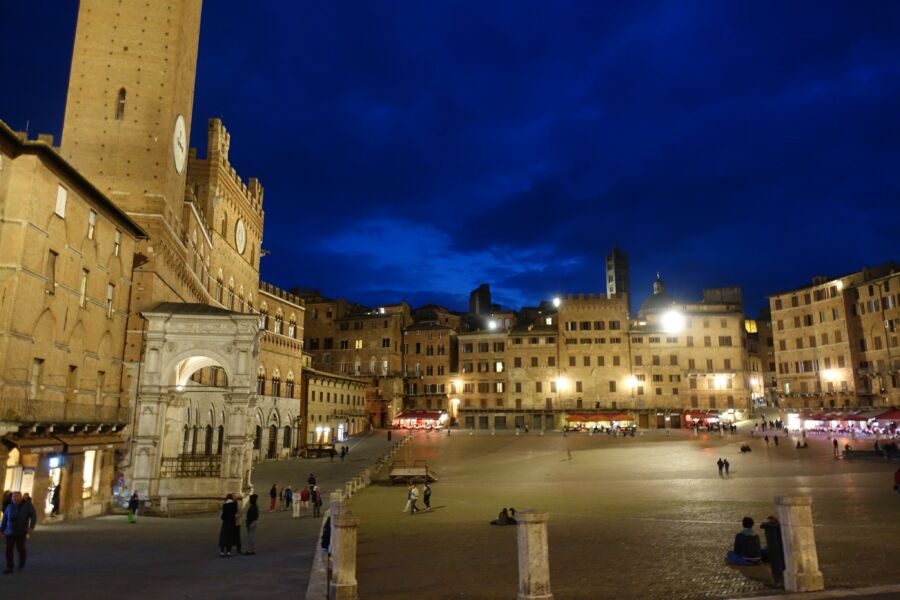[ad_1]

I consider an everyday dose of journey dreaming will be good for the soul. Stow away with me to Siena, Italy, on this excerpt from my ebook For the Love of Europe, a group of 100 of my favourite locations, individuals, and tales from a lifetime of European travels.
Stretched throughout a Tuscan hill, Siena presents maybe Italy’s greatest medieval expertise. Courtyards sport flower-decked wells, church buildings modestly share their artwork, and alleys dead-end into red-tiled rooftop panoramas. This can be a metropolis made for strolling. With its stony skyline and rustic brick lanes tumbling each which means, the city is an architectural time warp, the place pedestrians rule and the current feels just like the previous.
At the moment, the confident Sienese keep in mind their centuries-old accomplishments with satisfaction. Within the 1300s, Siena was one in all Europe’s largest cities and a serious army drive, in a category with Florence, Venice, and Genoa. However weakened by a disastrous plague and conquered by its Florentine rivals, Siena grew to become a backwater — and it’s been one ever since. Siena’s loss grew to become the traveler’s achieve as its political and financial irrelevance preserved its Gothic identification.
That is most notable in Il Campo, the place I start my stroll. On the middle of city, this nice shell-shaped piazza, that includes a sloped red-brick ground fanning out from the Metropolis Corridor tower, is designed for individuals, providing the right invitation to loiter. Il Campo immerses you in a world the place troubadours stroke guitars, lovers stroke each other’s hair, and bellies develop into pillows. It will get my vote for the best piazza in all of Europe.
Most Italian cities have a church on their important sq., however Il Campo gathers Siena’s citizenry round its Metropolis Corridor with its skyscraping municipal tower. Catching my breath after climbing to the dizzy prime of the 100-yard-tall bell tower, I survey the view and assume of the assertion this campanile made. In Siena, kings and popes took a again seat to the individuals, because it was all about secular authorities, civic society, and humanism.
The general public is welcome contained in the Metropolis Corridor the place, for seven centuries, instructive frescoes have reminded all of the consequences of excellent and dangerous authorities. One fresco reveals a utopian republic, blissfully at peace; the opposite fresco depicts a metropolis in ruins, overrun by greed and tyranny.
However the Church nonetheless has its place. If Il Campo is the guts of Siena, the Duomo is its soul — and my subsequent vacation spot. A number of blocks off the principle sq., sitting atop Siena’s highest level and visual for miles round, this white- and dark-green-striped cathedral is as ornate as Gothic will get. In and out, it’s lavished with statues and mosaics. The stony heads of practically 2,000 years of popes — that’s over 170 to this point — ring the inside, peering down from excessive above on all those that enter.
Nice artwork, together with statues carved by Michelangelo and Bernini, fills the church inside. Nicola Pisano carved the beautiful marble pulpit in 1268. It’s crowded with delicate Gothic storytelling. I stand up shut to review the scenes from the lifetime of Christ and the Final Judgment.
Making an attempt to flee the crowds within the cathedral and on the principle sq., I enterprise away from the town middle. I get misplaced on objective in Siena’s intriguing again streets, studded with iron rings for tethering horses and lined with colourful flags. These flags signify the town’s contrade (neighborhoods), whose fierce loyalties are on vivid show twice every summer time in the course of the Palio, a wild bareback horse race that turns Il Campo into an exhilarating and people-packed racetrack.
Wandering additional into the far reaches of the town, I’m tempted by Sienese specialties within the outlets alongside the best way: connoisseur pasta, classic Chianti, boar prosciutto, and the town’s favourite deal with: panforte.
Panforte is Siena’s declare to caloric fame. This wealthy, chewy concoction of nuts, honey, and candied fruits impresses even fruitcake haters. Native bakeries declare their recipe dates again to the thirteenth century. Some even drive staff to signal nondisclosure agreements to make sure they gained’t reveal the particular spice mix that flavors their model of this beloved — and really dense — cake.
A key to having fun with Siena is to think about it in its 14th-century heyday whereas making the most of at the moment’s trendy scene. After chewing on a piece of that panforte, I resolve to linger right here into the night, after the tour teams have boarded their buses and left city. I duck right into a bar for aperitivo (comfortable hour), which features a free buffet and now I’m primed and able to be part of the passeggiata — a night stroll. I time my arrival again at Il Campo to savor that stunning twilight second when the sky is a wealthy blue dome, no brighter than the proud Siena towers that appear to carry it excessive.
[ad_2]

